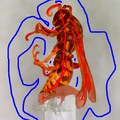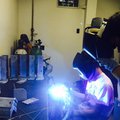OK everyone, let's get started. We're excited to have Ben Krasnow on the Hack Chat today. Welcome Ben!
 Hello!
Hello!
![]() Hi!
Hi!
 how's it going :D
how's it going :D

 Hey hey
Hey hey
 I think everyone knows you pretty well, but maybe you could give us a little about yourself?
I think everyone knows you pretty well, but maybe you could give us a little about yourself?
 Hi, Ben! Good to see you
Hi, Ben! Good to see you
 Sure. I work at Verily (Google Life Sciences) doing hardware prototyping. The goal is to make devices that detect disease earlier in progression when it is often cheaper and easier to treat. I also host the Applied Science channel on YouTube, where I show interesting and practical applications of scientific principles. Thanks for having me on the chat.
Sure. I work at Verily (Google Life Sciences) doing hardware prototyping. The goal is to make devices that detect disease earlier in progression when it is often cheaper and easier to treat. I also host the Applied Science channel on YouTube, where I show interesting and practical applications of scientific principles. Thanks for having me on the chat.
 dude thanks for being here :D
dude thanks for being here :D
 Thanks for being here
Thanks for being here
 Hi Ben!!
Hi Ben!!
 so, WHAT ABOUT hydrogen blimp quad drones, lol
so, WHAT ABOUT hydrogen blimp quad drones, lol
![]() Are you currently working on anything for the Covid-19? or you can;t say...
Are you currently working on anything for the Covid-19? or you can;t say...
 hi ben your my hero!
hi ben your my hero!
 always love seeing your videos and thought process!
always love seeing your videos and thought process!
 I have mostly been focused on early cancer detection projects.
I have mostly been focused on early cancer detection projects.
![]() ah .
ah .
![]() nanotech stuff?
nanotech stuff?
 hang on, are you one of the guys using radar as a medical imaging technology?
hang on, are you one of the guys using radar as a medical imaging technology?
 is this the right language
is this the right language
 As it turns out, in order for cancer cells to continue their rapid growth, they end up burning fuel in a less efficient way that creates literal dirty exhaust in the blood stream. Detecting trace amounts of this would be a very good way to search for latent cancers.
As it turns out, in order for cancer cells to continue their rapid growth, they end up burning fuel in a less efficient way that creates literal dirty exhaust in the blood stream. Detecting trace amounts of this would be a very good way to search for latent cancers.
 Ben, can I ask you to take a look at a few seconds of this video? It's a droplet of water on a film of carbon black, which you can make by just putting a candle underneath a glass slide. It has some really interested properties that reminded me of your graphite air bearing
Ben, can I ask you to take a look at a few seconds of this video? It's a droplet of water on a film of carbon black, which you can make by just putting a candle underneath a glass slide. It has some really interested properties that reminded me of your graphite air bearing
![]() In your experience, what have you found as a significant stumbling block for people to start or sustain a local-scale citizen science project?
In your experience, what have you found as a significant stumbling block for people to start or sustain a local-scale citizen science project?
 woo, back! Hi ben!
woo, back! Hi ben!
![]() Are you working on any sensors for detection of alkanes and aromatic compounds generated by malignant tumors.....from the canine reports?
Are you working on any sensors for detection of alkanes and aromatic compounds generated by malignant tumors.....from the canine reports?
 What are these 'dirty exhaust' exhaust you are looking for and how do you detect them?
What are these 'dirty exhaust' exhaust you are looking for and how do you detect them?
![]() regarding applied science, given 1000 different interests, how do you manage to finish any darn project? Any tips?
regarding applied science, given 1000 different interests, how do you manage to finish any darn project? Any tips?
![]() And does this method work for all types of cancers?
And does this method work for all types of cancers?
 I think a very common stumbling block for any type of project is building consensus of setting goals. For market-driven companies, it's a little more clear because customers ultimately decide with their wallet. For efforts that are not pushed by consumerism, it becomes more difficult to assess if a goal is being met.
I think a very common stumbling block for any type of project is building consensus of setting goals. For market-driven companies, it's a little more clear because customers ultimately decide with their wallet. For efforts that are not pushed by consumerism, it becomes more difficult to assess if a goal is being met.
 DrG, yes along those lines!
DrG, yes along those lines!
 Is your laboratory at your residence? If so, have there been any zoning law problems?
Is your laboratory at your residence? If so, have there been any zoning law problems?
 heh, or fed visits...
heh, or fed visits...
 Wish my garage was tidier (and a lot bigger), would be awesome to have a similar setup
Wish my garage was tidier (and a lot bigger), would be awesome to have a similar setup
 Ahron, that's cool!
Ahron, that's cool!
 lightning phil just start with tidying the garage up and fitting what you can in there, and actually doing the stuff you can do
lightning phil just start with tidying the garage up and fitting what you can in there, and actually doing the stuff you can do
 all this media hype and you can still make an ar15 at the average kitchen table
all this media hype and you can still make an ar15 at the average kitchen table
 Yes, my lab is my home garage. I used to work here full-time when I owned my own MRI devices business.
Yes, my lab is my home garage. I used to work here full-time when I owned my own MRI devices business.
 hold up you made mri's as a business?
hold up you made mri's as a business?
 what's that like
what's that like
![]() I see you use a Source Measurement Unit for some experiments, do you have any suggestions for measuring really low, complex impedances, like Lithium ION cells, Electrochemical impedance spectroscopy or Dielectric spectroscopy ?
I see you use a Source Measurement Unit for some experiments, do you have any suggestions for measuring really low, complex impedances, like Lithium ION cells, Electrochemical impedance spectroscopy or Dielectric spectroscopy ?
 I made MRI-compatible computer peripherals (keyboards, mice, etc) for use in cognitive experiments.
I made MRI-compatible computer peripherals (keyboards, mice, etc) for use in cognitive experiments.
 Any trouble with the government?
Any trouble with the government?
![]() I remember , no metal parts... whatsoever
I remember , no metal parts... whatsoever
 oh that's cool :D
oh that's cool :D
 Cool. The Fiancee does cognitive experiments.
Cool. The Fiancee does cognitive experiments.
![]() fiber optics based..
fiber optics based..
 Since the topic of this chat is "citizen science" I wanted to bring up a concept that has been stealing a lot of my attention lately: micrometeorites. Their existence has been known for a long time, but until around 2015 it was assumed by most scientists that they corroded away almost immediately upon landing on earths surface. This was disproved by a (literal) Norwegian Jazz musician named Jon Larsen when he was able to develop a method for finding and identifying these tiny objects in urban environments. Now, he (and other scientists in the field) is calling upon more citizen scientists to do like him to help improve those methods as it can make a huge impact on the field. Has anyone here ever considered doing or done something like that?
Since the topic of this chat is "citizen science" I wanted to bring up a concept that has been stealing a lot of my attention lately: micrometeorites. Their existence has been known for a long time, but until around 2015 it was assumed by most scientists that they corroded away almost immediately upon landing on earths surface. This was disproved by a (literal) Norwegian Jazz musician named Jon Larsen when he was able to develop a method for finding and identifying these tiny objects in urban environments. Now, he (and other scientists in the field) is calling upon more citizen scientists to do like him to help improve those methods as it can make a huge impact on the field. Has anyone here ever considered doing or done something like that?
 so you did stuff for active brain imaging as people were performing tasks or undergoing neurological events or whatever?
so you did stuff for active brain imaging as people were performing tasks or undergoing neurological events or whatever?
 I remember the concept of the computer mouse it's both simple and ingenious
I remember the concept of the computer mouse it's both simple and ingenious
 Other than that funny X-ray problem, I haven't had any trouble working here.
Other than that funny X-ray problem, I haven't had any trouble working here.
 does a faraday cage work for xrays
does a faraday cage work for xrays
![]() Ah, the backscatter X-ray machine chicken experiment ? :)
Ah, the backscatter X-ray machine chicken experiment ? :)
 or can one be made to?
or can one be made to?
![]() Ben, I love your work and excellent explanations. Are you based in Palo Alto?
Ben, I love your work and excellent explanations. Are you based in Palo Alto?
![]() lead?
lead?
 Thanks ben! Glad you got to me in this torrent of fans :)
Thanks ben! Glad you got to me in this torrent of fans :)
 Ben, I have a lot of surplus HV kit. It's in the UK, which isn't convenient, especially now. Happy to figure out a way of overcoming that though.
Ben, I have a lot of surplus HV kit. It's in the UK, which isn't convenient, especially now. Happy to figure out a way of overcoming that though.
![]() Sigh... why isn't there a central moderator to funnel questions to? This is a messy free-for-all.
Sigh... why isn't there a central moderator to funnel questions to? This is a messy free-for-all.
![]() Do you still have your delorean car? :)
Do you still have your delorean car? :)
 @Applied Procrastination - I think The Thought Emporium did a video about that, collecting micrometeroids from rooftops.
@Applied Procrastination - I think The Thought Emporium did a video about that, collecting micrometeroids from rooftops.
 I spent a couple of afternoons searching for iron tektites in at the bottom of downpouts in my house by using a magnet. I didn't discover anything that I thought positively was a tektite, but my attempt was half hearted.
I spent a couple of afternoons searching for iron tektites in at the bottom of downpouts in my house by using a magnet. I didn't discover anything that I thought positively was a tektite, but my attempt was half hearted.
 what was your x-ray issue? i recently got into trouble from my university for having an x-ray in my dorm room, they were not happy about this one
what was your x-ray issue? i recently got into trouble from my university for having an x-ray in my dorm room, they were not happy about this one
 hahaha sam
hahaha sam
 I was just about to ask about that, when I was doing vacuum experiments I noticed that one time when my vacuum became too soft and gas discharge occurred it seemed (according to my geiger counter) to start producing a bunch of Xrays even though the largest voltage differential was only about 500 V
I was just about to ask about that, when I was doing vacuum experiments I noticed that one time when my vacuum became too soft and gas discharge occurred it seemed (according to my geiger counter) to start producing a bunch of Xrays even though the largest voltage differential was only about 500 V
 That was probably noise pickup
That was probably noise pickup
 I wonder where the cheapest place without legal impediments to hardware hacking is
I wonder where the cheapest place without legal impediments to hardware hacking is
 I have this book, which has some interesting pictures: https://www.amazon.com/Search-Stardust-Micrometeorites-Terrestrial-Imposters/dp/076035264X
I have this book, which has some interesting pictures: https://www.amazon.com/Search-Stardust-Micrometeorites-Terrestrial-Imposters/dp/076035264X
 hardware hacking in general or stuff with x-rays?
hardware hacking in general or stuff with x-rays?
 @Sam Zeloof IIRC, a neighbor caught wind that he had an X-ray source in the garage and he got a visit from a nice government man who decided his shielding precautions were sufficient?
@Sam Zeloof IIRC, a neighbor caught wind that he had an X-ray source in the garage and he got a visit from a nice government man who decided his shielding precautions were sufficient?
 @Dan Maloney That is probably true, Hackaday has even written an article about it a while back :) I'm considering making a YouTube video on it myself as well (well, I will probably do that at some point to be honest). It's just a field where I see sooo many potential projects and improvements that can be made that actually have the potential to make a scientific impact
@Dan Maloney That is probably true, Hackaday has even written an article about it a while back :) I'm considering making a YouTube video on it myself as well (well, I will probably do that at some point to be honest). It's just a field where I see sooo many potential projects and improvements that can be made that actually have the potential to make a scientific impact
 Applied Proc, that's pretty interesting. I hadn't heard of this. There is always a sort of tension between "leave it to the experts", and just doing things because they seem interesting and useful. It's a pretty fine line, and even before covid, there is a lot of room between too much emphasis placed on experts, and too much wild west.
Applied Proc, that's pretty interesting. I hadn't heard of this. There is always a sort of tension between "leave it to the experts", and just doing things because they seem interesting and useful. It's a pretty fine line, and even before covid, there is a lot of room between too much emphasis placed on experts, and too much wild west.

https://hackaday.com/2019/08/21/fantastic-micrometeorites-and-where-to-find-them/
Fantastic Micrometeorites And Where To Find Them
Space is very much the final frontier for humanity, at least as far as our current understanding of the universe takes us. Only a handful of countries and corporations on Earth have the hardware to readily get there, and even fewer are capable of reaching orbit.
 Hah, I was just about to link to that article
Hah, I was just about to link to that article
 @Christian hardware hacking in general
@Christian hardware hacking in general
 re "experts" vs everyone-for-themselves, it's worth considering your impact on local environment and on the supply chains. if you can build one of something in your garage but you need a hundred thousand of them, it's unlikely the work you did to figure out materials for that one is going to help
re "experts" vs everyone-for-themselves, it's worth considering your impact on local environment and on the supply chains. if you can build one of something in your garage but you need a hundred thousand of them, it's unlikely the work you did to figure out materials for that one is going to help
 Ben: that's a line you walk really well. I admire the thoroughness and discipline of your approach, but even more your ability to just actually do the hard work, rather than be intimidated by it.
Ben: that's a line you walk really well. I admire the thoroughness and discipline of your approach, but even more your ability to just actually do the hard work, rather than be intimidated by it.
 me: what sort of legal impediments? don't know about US law but if its not professional scale you should be fine doing it at home, right?
me: what sort of legal impediments? don't know about US law but if its not professional scale you should be fine doing it at home, right?
 plenty of amateur scientists have been raided
plenty of amateur scientists have been raided
 except for radiation/hazardous materials
except for radiation/hazardous materials
 especially with the rise of meth labs etc
especially with the rise of meth labs etc
 Long ago, someone reported me to some kind of authority for showing an X-ray (CT scanner) in my video. I eventually was contacted by state officials, and they were very polite and helpful. :)
Long ago, someone reported me to some kind of authority for showing an X-ray (CT scanner) in my video. I eventually was contacted by state officials, and they were very polite and helpful. :)
 how's the cookie machine?
how's the cookie machine?
 @Ben Krasnow You are an inspiration to many of us and I really want to thank you for your efforts, your channel, your excellence.
@Ben Krasnow You are an inspiration to many of us and I really want to thank you for your efforts, your channel, your excellence.
![]() Ben: did the person contact you first before reporting ?
Ben: did the person contact you first before reporting ?
 One of the really intriguing projects I see in Micrometeorite research is attempting to implement a visual classifying algorithm. This is not my expertise, so I'm not sure if I'll attempt it, but something like that would make a huge impact on the field (the field is quite small obviously). Even if the classifier is heavily biased towards false positives it would still be massively useful as the main point of Larsen's method is to increase the signal to noise ratio when searching through a batch of rocks in the microscope
One of the really intriguing projects I see in Micrometeorite research is attempting to implement a visual classifying algorithm. This is not my expertise, so I'm not sure if I'll attempt it, but something like that would make a huge impact on the field (the field is quite small obviously). Even if the classifier is heavily biased towards false positives it would still be massively useful as the main point of Larsen's method is to increase the signal to noise ratio when searching through a batch of rocks in the microscope
 What's funny @Sam Zeloof is that your second-hand machine is WAY less scary than the one @Ben Krasnow got reported for
What's funny @Sam Zeloof is that your second-hand machine is WAY less scary than the one @Ben Krasnow got reported for
 @Ben Krasnow did you make the gingery home workshop machines, or am I remembering this wrong?
@Ben Krasnow did you make the gingery home workshop machines, or am I remembering this wrong?
 It is my very future goal to do automated scanning for large fields of potential micrometeorites and then sort them out automatically. make a conveyor belt of sorts.
It is my very future goal to do automated scanning for large fields of potential micrometeorites and then sort them out automatically. make a conveyor belt of sorts.
 https://www.amazon.com/Build-Metal-Working-Scrap-Complete/dp/1878087355 for reference
https://www.amazon.com/Build-Metal-Working-Scrap-Complete/dp/1878087355 for reference
 Although TBH, when it comes to universities "ask forgiveness not permission" is a hard rule.
Although TBH, when it comes to universities "ask forgiveness not permission" is a hard rule.
 @me hm I wonder why? I mean hardware hacking in most cases does no involve chemicals that could be considered dangerous or used to make drugs.
@me hm I wonder why? I mean hardware hacking in most cases does no involve chemicals that could be considered dangerous or used to make drugs.
 or am I missing something
or am I missing something
 decapping may
decapping may
 /delayering
/delayering
![]() Ben: if it's ok, when you converted your mill. did you use servo motors.. or steppers?
Ben: if it's ok, when you converted your mill. did you use servo motors.. or steppers?
 @alexwhittemore agreed... cabinet x rays are pretty safe. but that didn't seem to make a difference in terms of action on the school's part. also you still have to register cabinet x-rays in most states
@alexwhittemore agreed... cabinet x rays are pretty safe. but that didn't seem to make a difference in terms of action on the school's part. also you still have to register cabinet x-rays in most states
 Mike, I used the original servos. Tidy upgrade.
Mike, I used the original servos. Tidy upgrade.
![]() ah ok..
ah ok..
 hmmm that could be! btw heat decapping curious marc showed a while back works great - but it smells
hmmm that could be! btw heat decapping curious marc showed a while back works great - but it smells
![]() I was recently exploring how citizenscience might fit into the GIS realm - especially with tons of civic data and satellite data out there for free. Feel like it would be fantastic for local scale environmental monitoring. Other than the somewhat steep learning curve, it would be a good way to introduce people to CS. Any easy tools out there? I know NASA has a couple of online interfaces to produce timelapses of an area.
I was recently exploring how citizenscience might fit into the GIS realm - especially with tons of civic data and satellite data out there for free. Feel like it would be fantastic for local scale environmental monitoring. Other than the somewhat steep learning curve, it would be a good way to introduce people to CS. Any easy tools out there? I know NASA has a couple of online interfaces to produce timelapses of an area.
 @Sam Zeloof What was the ultimate outcome? I was lucky to live in an extremely hands-off corner of campus where just about the only thing you'd get nicked for was throwing stuff out the window, which the administration looked down on VERY harshly.
@Sam Zeloof What was the ultimate outcome? I was lucky to live in an extremely hands-off corner of campus where just about the only thing you'd get nicked for was throwing stuff out the window, which the administration looked down on VERY harshly.
 biohacking too
biohacking too
 I hadn't heard of Gingery home workshop. Looks cool.
I hadn't heard of Gingery home workshop. Looks cool.
 @Sam Zeloof but then, don't you now have a lab on campus you could stuff it in anyway?
@Sam Zeloof but then, don't you now have a lab on campus you could stuff it in anyway?
 Lutetium
Lutetium
Discussions
Become a Hackaday.io Member
Create an account to leave a comment. Already have an account? Log In.